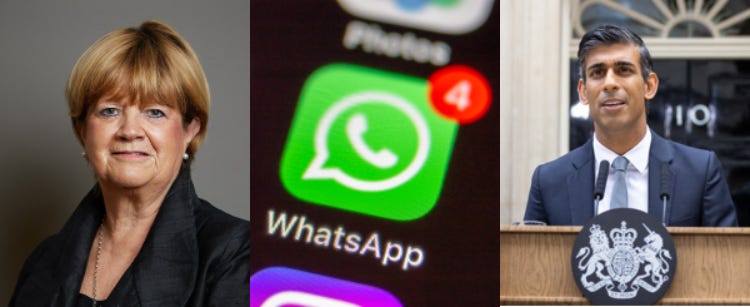We need a Lockdown Inquiry, too
This week’s tit-for-tat over ministers’ WhatsApp messages avoids the real question of Covid: were the government right to make us stay at home?
The ongoing and increasingly tedious battle between the UK government and the Covid-19 Inquiry it created has reached a new turn with the Cabinet Office announcing legal action over the disclosure of government documents and ministers’ messages. But the truth is that the Inquiry could well be a waste of time.
The Inquiry has a wide-ranging remit to look at how well prepared the state was for a pandemic, the decision-making of ministers, the impact on health systems, vaccines, procurement, testing and tracing, government business and financial responses, health inequalities, education, and other public services.
The current argument concerns the way that government decisions were made. The Cabinet Office only wants to release information relevant to the Inquiry. The chair of the Inquiry - Baroness Heather Hallett, a former Court of Appeal judge – wants access to everything, including WhatsApp messages. She argues that she should be the one to decide if something is relevant or not.
On the one hand, there is a case for retaining some degree of privacy over decision-making. Whatever the merits of discussing government business on WhatsApp, ministers should be allowed to keep their half-baked thoughts or unrelated musings private. To set a precedent in favour of disclosure may have a chilling effect on open-minded exploration of policy options, as Mick Hume notes.
On the other hand, it’s a rather telling indictment of the state of public affairs, both political and legal, that the government doesn’t seem to trust the Inquiry chair it appointed to decide what is relevant and to keep the other stuff confidential. And this rush to defend confidentiality is rather at odds with the government’s Online Safety Bill, which will jeopardise everybody’s privacy.
But regardless of these arguments, interrogating how decisions were made seem less relevant than what decisions were made and whether they were the right ones, all things considered. What should be debated right now are the merits of lockdowns, school closures and other restrictions. There were plenty of warnings at the time about the potential impacts of restrictions on our liberties and wider society.
For example, the Office for National Statistics notes today that closing schools had a disproportionate impact on GCSE students from more deprived areas, who were less likely to have the advantages of web-connected electronic devices and private tutors. The BBC reported this week on how small and medium-sized businesses were struggling to repay the Bounce Back Loans that kept them going through lockdowns, resulting in a consequent drag on the economy. Businesses that are weighed down by debt cannot invest for the future. But to be honest, many foresaw this at the time; yet those who spoke out, like grassroots campaign organisations such as UsforThem were often ignored; worse demonised.
It’s also worth noting that given the track record of public inquiries in the UK, even if the Covid-19 Inquiry is seriously willing to examine these issues; to ask and answer difficult questions, it could take years to come to any final conclusions – when other countries have had such inquiries completed months ago. And the more the government appears evasive and defensive, the more it fuels a climate of mistrust and conspiracy-mongering. As the old saying goes, ‘justice delayed is justice denied’.
Related reading
This Covid inquiry is already a farce
Fraser Myers, Spiked, 31 May 2023
Sunak’s absurd decision to sue the Covid inquiry judge
Steven Barrett, Spectator, 2 June 2023
Questions the Covid Inquiry must ask
Thomas Fazi and Toby Green, UnHerd, 28 February 2023



